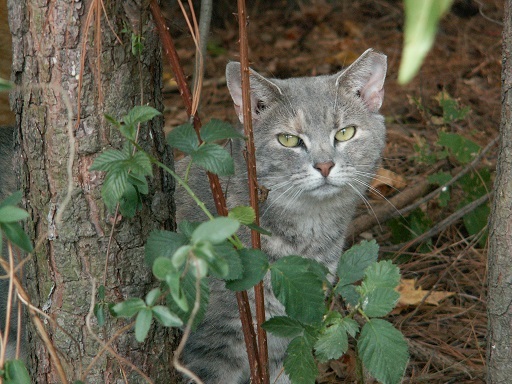Community Cats
Living With Cats in Your Community
Trap Neuter Return (TNR) - A Guide to Community & Feral Cats

Courtesy: Ally Cat Allies
What is a community/feral cat?
A community cat is a cat that lives outdoors and does not have a particular home or owner. They may be friendly, or in some cases, feral (not socialized with people). These cats typically depend on humans for their food whether it is a neighborhood caretaker, dumpster, or other source.
What is TNR?
Trap-Neuter-Return is an effective and humane way to stabilize feral and community cat populations. Cats are humanely trapped, neutered, ear tipped (the universal symbol of a sterilized cat) and then returned to their outdoor home.
What are the benefits of TNR?
TNR benefits the cats and the community! This technique helps cats live healthier and improved lives, in turn, the community benefits because the feral and community cat population stabilizes and declines over time. TNR reduces cat related nuisances and benefits public health and safety. An effective TNR program preserves the lives of feral and community cats.
Know that the animal shelter does not bring in healthy adult roaming cats. Adults are defined as 4 months and older. If you attempt to bring them to the shelter, you will be turned away.
Found a stray cat. Now what?
Is the cat sick, injured, or in immediate danger?
|
No
Leave the cat alone.
This is a community cat and he/she has learned to live outside.
|
|
Yes
Bring the cat to ACC.
|
Is it safe for cats to live outdoors?
Community cats are capable of thriving outside. If a cat is healthy, it's likely he/she has a good source of food and shelter. Not all cats are adjusted to living inside and prefer to live outside.
Found baby kittens? Stop! Don't kit-nap them.
If the kittens eyes are closed and/or they are unable to walk and they are quiet, leave them alone. The mother likely nearby and could be gone for a few hours. Monitor them.
If the kittens are meowing, stay about 30 feet away and check to see if the mom come back. If there is no sign of her after several hours, gather the kittens, keep them warm, and bring them to ACC.
What if the cat is owned and someone is looking for them?
Lost cats are 18 times more likely to find their owners if left where they are. Only 3.9% of cats owners into the shelter are reunited with their owners.
I don't want cats in my yard.
The most effective and efficient way to decrease the amount of cats in your yard is Trap-Neuter-Return or TNR. Cats are territorial and if you alter the cats in your yard, they will keep other cats away, and they will not be able to reproduce. There are also effective cat deterrents available to use.
I have adoptable kittens who are eating on their own. What's next?
Bring them to ACC and depending on their size they will go to foster care or be placed immediately into our adoption program. Animals that have been cared for over 14 days are considered owner surrenders.
Videos to help explain Community Cats
If you are looking to spay/neuter a community or colony cat, fill out the community cat spay/neuter application.
You can donate to our spay/neuter program to help us keep this program low-cost.
Cats who can come to the shelter:
- Kittens who are 6 weeks - 4 months old (with or without a mother).
- Kittens who are 0-6 weeks old whose mother is known to be missing or gone.
- Cats and Kittens who are in immediate danger.
- Cats and kittens of any age who are sick or injured.
- Mother cats with kittens who are 0-6 weeks old.
Cats who we are not accepting at this time:
- Adult cats over 4 months who are healthy.
- Adult cats over 4 months who are feral (meaning, not friendly or can be safely handled by humans); especially if they are being trapped. These cats are at risk because they are not safe to be adopted and the shelter environment needlessly stresses them. Stress leads to illness which can easily spread among other cats.
Found kittens?
Here's a helpful kitten aging chart showing the ages of kittens from newborn to 8 weeks old. Thanks to the Kitten Lady for creating this!
The Humane Society of Charlotte is offering low-cost TNR services through their clinics. Learn more about their Charlotte Community Cat Services
ACC is supporting collaborative efforts with community partners to help with spaying/neutering community cats in Charlotte/Mecklenburg. If you have a community cat that needs to be spayed or neuter, fill out an online application on our spay/neuter page.
What's the difference between domesticated, community, working, and feral cats? Check out this resource from Alley Cat Allies!
The Friends of Feral Felines group is willing to help with TNR services to residents in Mecklenburg County. They will not set traps for anyone looking to remove cats from their properties. If you are willing to do TNR for cats in your neighborhood, contact them at feralangels@gmail.com or call the hotline at 704.348.1578
For more information on local TNR resources: